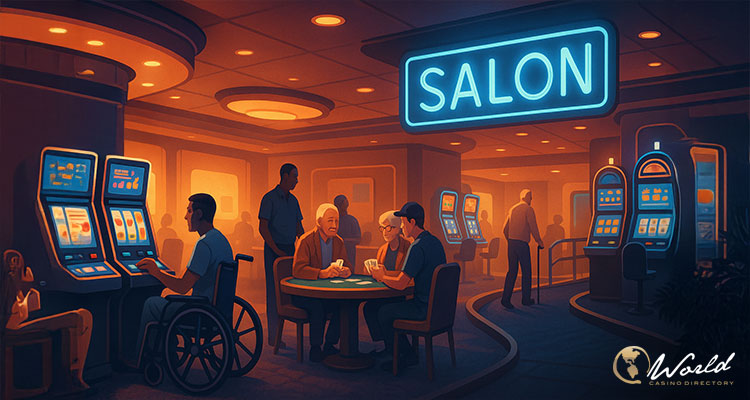Nevada regulators are preparing to loosen restrictions on casino salons, private gaming rooms designed to cater to high-value patrons, in an effort to reverse slowing tourism and keep the state competitive.
The Nevada Gaming Control Board (NGCB) has endorsed a sweeping set of amendments (pdf) to its two-decade-old salon rules. These changes—now awaiting a final vote from the Nevada Gaming Commission in late September—would lower financial entry thresholds, introduce poker as a salon option, and give casinos more flexibility in setting their own standards.
For Chair Mike Dreitzer, the motivation behind the changes is clear: “The goals remain the same. Bringing more revenue to the state of Nevada in uncertain times and allowing for flexible and unique amenities that certain non-restricted licensees offer their valued patrons. All of this is in the face of growing competition across the U.S. and the world.”
From High-Rollers Only to Wider Accessibility
Salons were first authorized in 2001 to draw wealthy gamblers who preferred privacy after 9/11 created economic turbulence for Nevada. At the time, players needed to front $500,000 in cash or credit to enter. That barrier was reduced to $300,000 during the Great Recession of 2008, but salons remained the exclusive domain of major Strip resorts.
The NGCB now recommends cutting the deposit requirement dramatically, from $300,000 to just $20,000. Casinos could also request permission to set their own minimums, with the Board chair able to grant exceptions for certain properties or customers. This shift, according to Dreitzer, is about balancing exclusivity with accessibility: enough of a threshold to preserve the salon experience, but low enough to attract new types of players.
Virginia Valentine, president and CEO of the Nevada Resort Association (NRA), called the lowered minimums “the most significant impact in the legislation,” arguing that Nevada had placed itself at a disadvantage compared with other jurisdictions by requiring such high entry costs. “By lowering the minimum front-money requirements while offering the same privacy, security, and elevated gaming experience, we believe we’ll attract casino patrons who aren’t playing here now,” she said, according to CDC Gaming.
Poker and Expanded Offerings
One of the most notable changes is the proposed inclusion of poker in salons. Industry leaders have long argued that high-stakes card games are thriving in California card rooms and underground markets, and Nevada is missing out.
Under the plan, poker games in salons would require a $20,000 table minimum, with each player contributing at least $10,000. Unlike traditional salon play, every participant—not just the host—would undergo financial checks.
Senior Deputy Attorney General John Michela emphasized poker’s potential, stating that moving such play from private homes into regulated casinos could generate “significant revenue for Nevada.”
Tourism and Compliance Pressures
The push to expand salon access coincides with mounting challenges for Las Vegas. Visitor numbers have dropped every month this year compared with 2024, signaling pressure on one of Nevada’s most vital industries. At the same time, major operators, including Wynn, MGM, and Resorts World, have been hit with multimillion-dollar fines in 2025 over anti-money laundering (AML) compliance.
Supporters argue that salons could help address both problems. Private rooms offer greater privacy for celebrities and convention executives while also providing tighter oversight than the casino floor. Casinos say this dual benefit—new revenue paired with stronger compliance—makes salon modernization a smart response to current headwinds.
Still, regulators are cautious. Enforcement chief Kristi Torgerson urged a $10,000 minimum to ensure exclusivity and prevent salons from being overrun. “If the amount were zero, it would increase the number and use of salons and require the Board to dedicate more staff to covering them,” she noted.
Industry Voices Call for Flexibility
At the most recent NGCB workshop, executives from Wynn Las Vegas, MGM Resorts, and Hard Rock Las Vegas backed broader access. Charlie Stone of Wynn argued that casinos should decide for themselves who qualifies: “The zero requirement makes sense. For a celebrity or athlete and others who value privacy, it’s a nice way to accommodate them. We’re in the age of cell phones; everyone has a camera in their pocket. It’s a great way to provide a better level of service and security to attract new customers.”
Joe Lupo, president of Hard Rock Las Vegas, emphasized that salons need to evolve alongside the Strip’s changing demographics: “Things have changed in this country. Online gaming has taken money out of the pockets of consumers coming here to Las Vegas. We need to be more progressive. While it’s been said the salons are successful, I tell you to walk through casinos and you’ll see empty salon after empty salon. I don’t think they’re successful. They will be successful if we can utilize them more.”
Valentine framed the debate in terms of Las Vegas’s identity as more than just a gaming hub. With professional sports teams, world-class events like Formula One, and a growing celebrity presence, she argued, the definition of a “high-value” guest has shifted. “Some of these guests are seeking the same level of privacy and security as the law envisioned when passed in 2001,” she said.
Balancing Innovation and Oversight
While some regulators fear lowering thresholds could stretch enforcement resources, board members ultimately coalesced around the $20,000 standard, with the possibility of exceptions. Dreitzer described this compromise as a way to “balance out everyone’s concerns.”
As the Nevada Gaming Commission prepares to make the final decision in September, the stakes extend beyond gaming salons. With tourism lagging and compliance scrutiny intensifying, the state’s willingness to adapt could determine whether Las Vegas keeps its reputation as both the regulatory “gold standard” and the global leader in gaming experiences.


